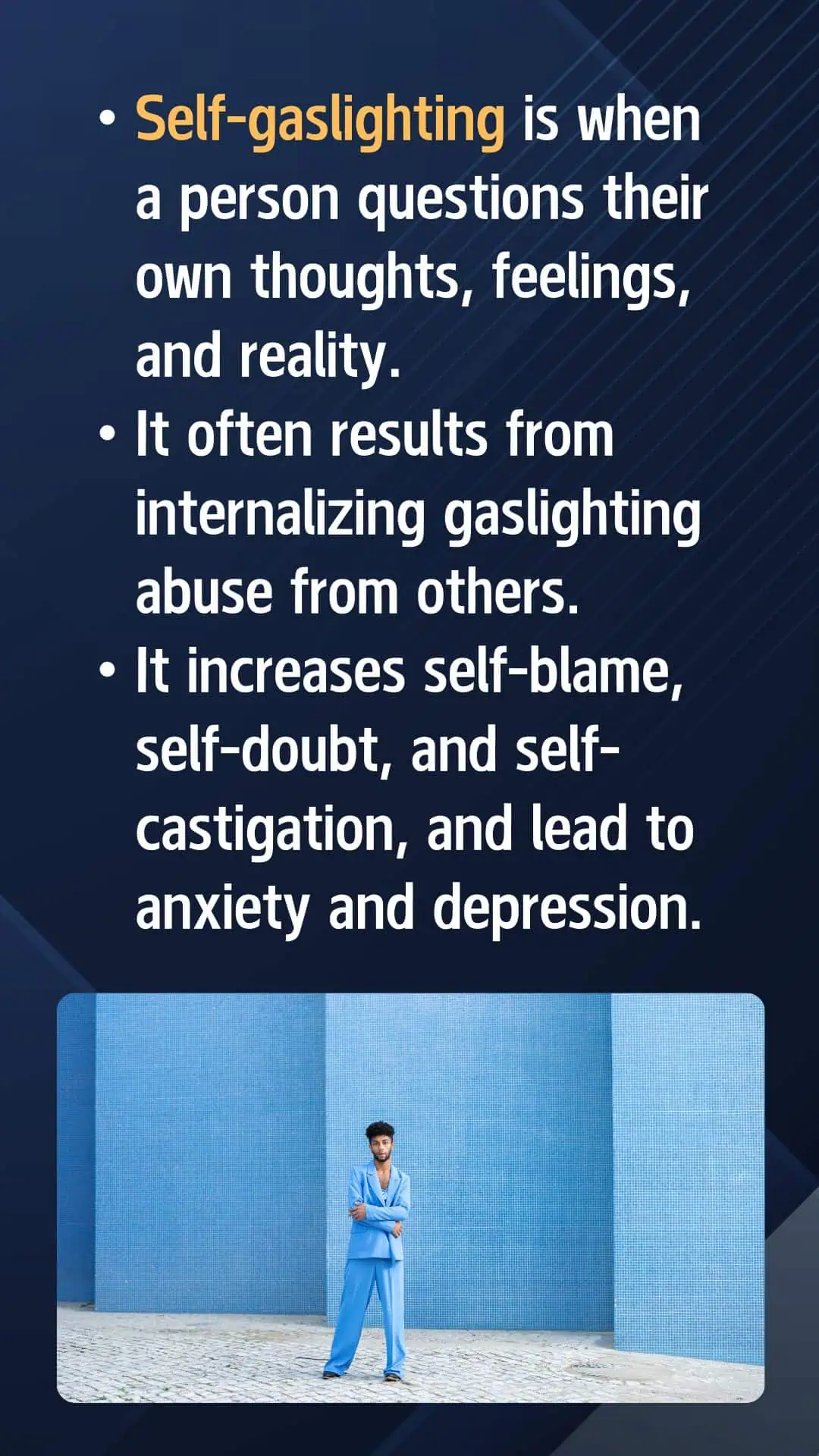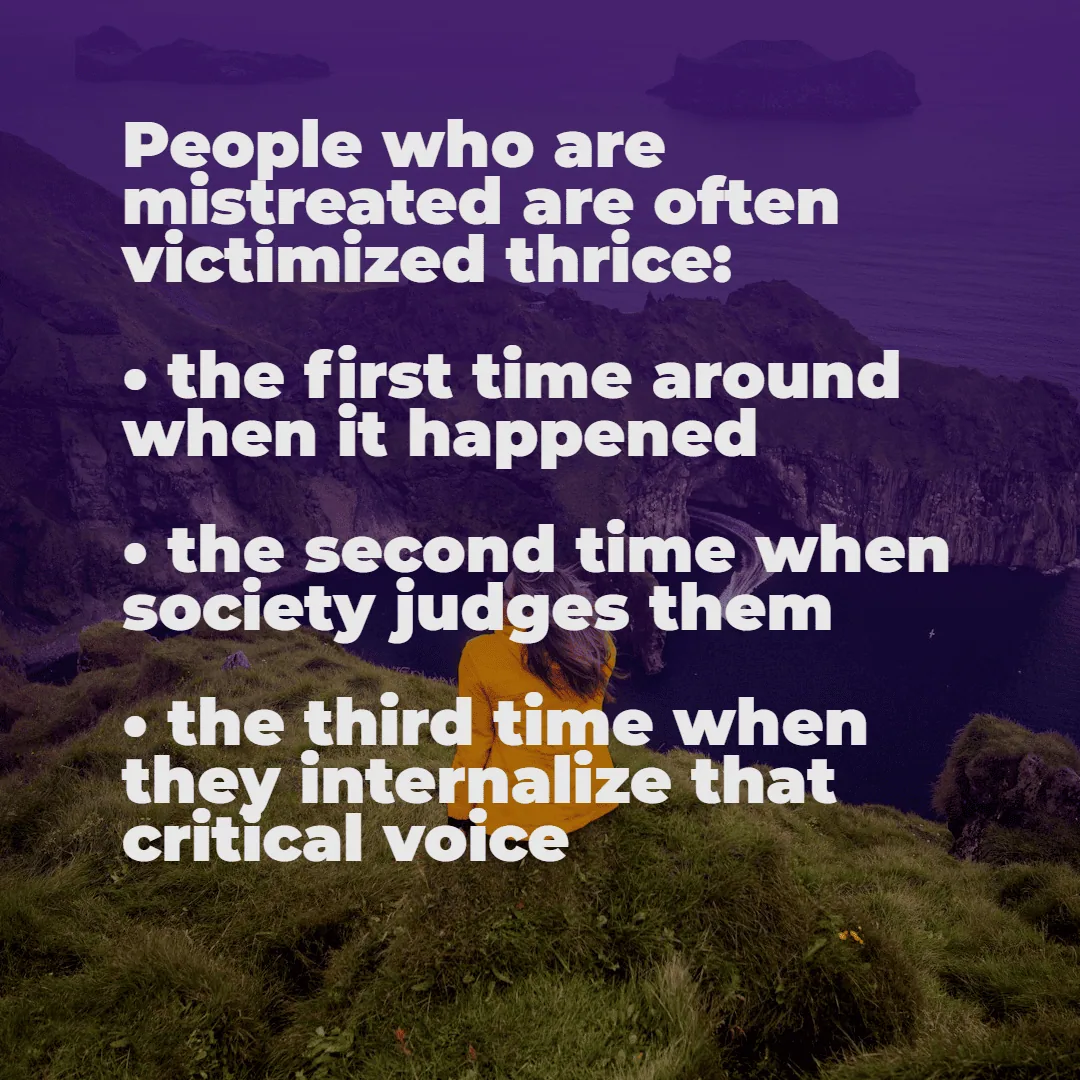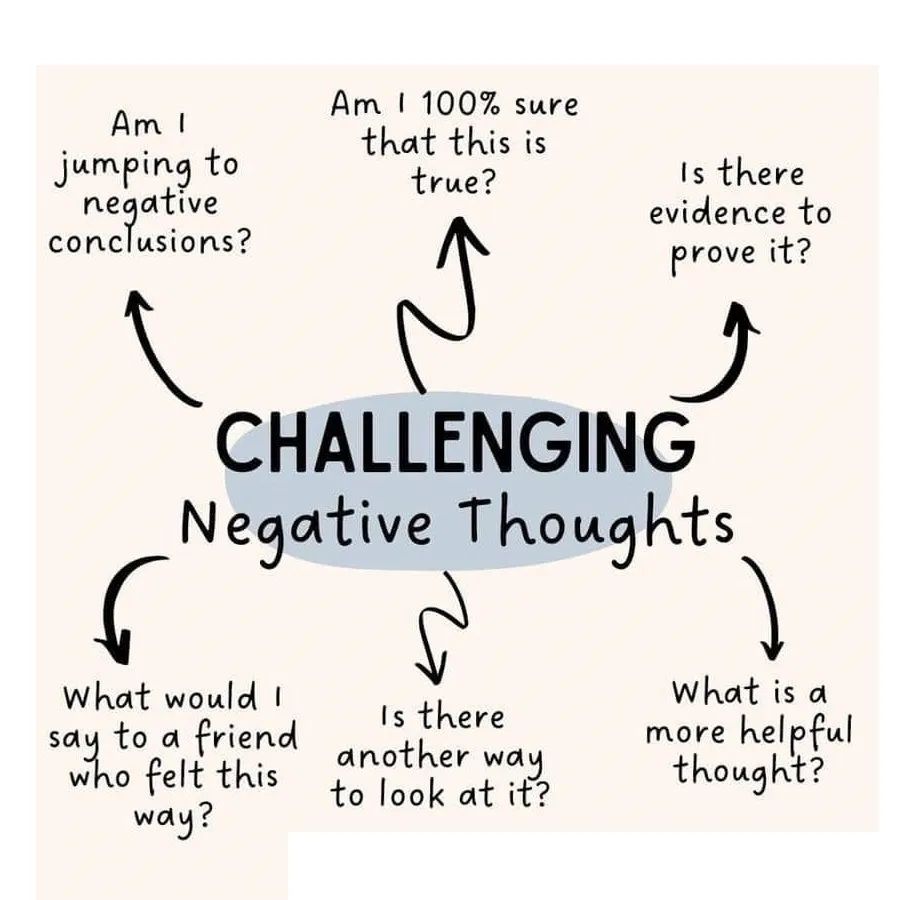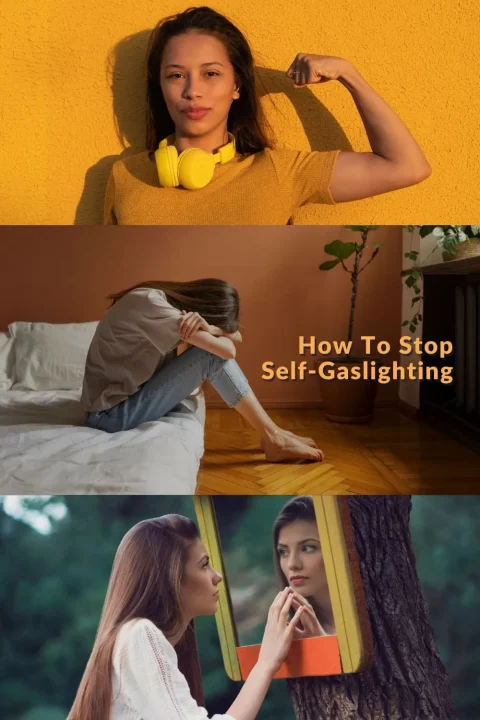Today's Saturday • 10 mins read
— By Dr. Sandip Roy.
You think it’s justifiable,
I think it’s pretty cruel
And you know you lie best
when you lie to you.
— The Chicks
- Have you ever thought or felt like your emotions were unjustified?
- Does your reality seem unreal, and your experiences invalid?
- Do you think you are your own worst critic?
You could be self-gaslighting yourself.
Gaslighting is mental manipulation by subtle means. The gaslighter makes the victim doubt their version of reality, so they think they might be going insane.
Robin Stern, in her book The Gaslight Effect, says gaslighting happens by “mutual participation” between the “gaslighter” (perpetrator) and “gaslightee” (victim).
Now imagine how pathetic it is when the victim and the offender are the same person — you. You made your mind wonder if you were going crazy.
So, how to know if you are self-gaslighting? And how can you stop this slow self-destruction?
Self-gaslighting is…
Self-gaslighting is when a person questions their own abilities, achievements, worth, beliefs, perceptions, memories, and feelings. It often results from internalizing gaslighting abuse from others. It increases self-blame, self-doubt, and self-castigation, and leads to anxiety and depression.

- Self-gaslighting is like an internal voice that constantly questions your reality, making you wonder if you’re overreacting or imagining things.
- It can come from being a victim of gaslighting by others, holding low self-esteem, or having a strong desire to please others.
- Self-gaslighters are often overwhelmed from constant self-doubt, persistent negative self-talk, and the pressure to meet unrealistic expectations.
- Stressful situations, like disagreements, conflicts, or misunderstandings can trigger self-gaslighting.
- Severe self-gaslighting can be caused by situations such as sexual assault, where survivors might question their memories, experiences, and feelings.
Self-gaslighting takes away the truth from your experiences and makes you question your emotions.
The Origin of Your Self-Gaslighting Voice
This is how you develop a self-gaslighting voice:
People around you give you negative messages about yourself.
⬇
Their messages destroy your self-confidence and self-worth.
⬇
Your inner voice learns to say you’re weak and worthless.
⬇
You’re confused about who you are and what to do.
⬇
You isolate yourself, and stop sharing your stories.
People who self-gaslight are often the product of a society that judges and blames victims for their inadequacies and failings.
13 Signs of Self-Gaslighting
Self-gaslighting can lead to a distorted self-image, damaged self-esteem, and a weakened sense of self. It can make you vulnerable to manipulation and control by others.
Look out for these signs to know if you are gaslighting yourself:
- Constant Self-Doubt: You frequently question your own thoughts, feelings, and perceptions, feeling less and less confident in making decisions.
- Invalidate Your Emotions: You tell yourself your feelings are not valid or not worth acknowledging, and mark yourself as oversensitive or overreacting.
- Excessively Self-Criticize: You harshly criticize yourself for mistakes or perceived shortcomings, often beyond what is reasonable or warranted.
- Blame Yourself Unfairly: You go out of your way to take responsibility for things that are not your fault or beyond your control, leading to feelings of guilt and shame.
- Downplay Your Achievements: Your default mode is to minimize or dismiss your successes and accomplishments, attributing them to luck or external factors rather than your abilities.
- Ruminate On Past Mistakes: You constantly dwell on past errors and use them as evidence of your incompetence or unworthiness.
- Fear Expressing Yourself: You avoid sharing your thoughts and feelings with others because you believe what you think or hold is wrong or invalid.
- Feel Overwhelmed By Others’ Opinions: You give more weight to other people’s opinions and perspectives, often drowning out your own voice and say.
- Struggle With Decision-Making: You find it difficult to make quick choices because you constantly second-guess yourself and fear making the wrong decision.
- Over-Apologize: You frequently say ‘Sorry’, even when unnecessary, as a way to avoid or deflect potential criticism or conflict.
- Neglect Self-Care: You prioritize others’ needs over your own and feel undeserving of taking care of yourself.
- Negative Self-Talk: Your internal dialogue is critical, dismissive, or belittling towards yourself.
- Down-Compare Yourself With Others: You compare yourself unfavorably to others and think that you will perpetually remain inferior or inadequate.

13 Ways Self-Gaslighting Damages You
Gaslighting is a type of psychological abuse (Sweet, 2019). So, when the victim is the abuser, gaslighting can have more damaging long-term effects:
- Low Self-Esteem: Persistent self-doubt and negative self-talk can erode your self-confidence, making you feel unworthy or incapable even when you are not.
- Anxiety and Depression: Constantly invalidating your emotions and experiences can build chronic stress, anxiety, and depressive symptoms.
- Poor Decision-Making: Self-gaslighting can make it difficult to trust your judgment, leading to spending a long time in indecision, and second-guessing even simple choices.
- Identity Confusion: Continuously questioning yourself and overvaluing others’ opinions can weaken your sense of self-identity and create identity confusion.
- Unfulfilling Relationships: You tolerate unhealthy behaviors, but keep your desires unvoiced. You cannot ask for what you need or expect in a relationship. You cannot set healthy boundaries.
- Isolation and Loneliness: The feeling that your thoughts and emotions are invalid can make you withdraw from social interactions, manifesting your loneliness.
- Increased Susceptibility to External Gaslighting: If you’re full of self-doubts, you’re more vulnerable to gaslighting and manipulation from others.
- Reduced Motivation and Productivity: Negative self-perception can reduce your drive to pursue goals, causing you to procrastinate and decrease your productivity.
- Health Issues: Chronic stress and emotional turmoil from self-gaslighting can result in physical symptoms like headaches, fatigue, and digestive problems.
- Emotional Exhaustion: The constant internal battle of self-gaslighting can lead to burnout, leaving you physically drained, emotionally numb, and mentally overwhelmed.
- Stunted Personal Growth: Doubting your abilities can cut down your personal development and potential, preventing you from taking on new challenges.
- Loss of Opportunities: It can cause you to shy away from opportunities for fear of failure or rejection. It may even make you quit when you might be close to a worthwhile goal.
- Difficulty in Self-Advocacy: You cannot seem to stand up for yourself or assert your rights, leading to being overlooked or taken advantage of.
How To Stop Self-Gaslighting
- Be Aware of self-gaslighting: Stay alert to spot your self-gaslighting. Develop self-awareness and self-reflection. Note your inner dialogue: Are you second-guessing yourself, dismissing your feelings, or minimizing your achievements, or feeling crazy?
- Educate Yourself: Check online resources or talk to an expert to understand the psychology, causes, and effects of self-gaslighting. Knowledge can help you recognize and process it better.
- Validate Your Emotions: Remind yourself that your emotions are valid and worthy of attention; don’t let anyone tell you otherwise. Learn to embrace your negative emotions, not push them away.
- Challenge Negative Thoughts: Don’t accept your self-critical thoughts passively — challenge and prove them wrong. Never forget that your thoughts don’t always tell the truth.

- Seek Evidence: Show your mind evidence that debunks your self-gaslighting thoughts. If you think you’re not good enough, make a list of your successes, accolades, and strengths. Look for other explanations.
- Do Positive Self-Talk: Reframe your self-negating thoughts in a more positive light. Fill your self-talk with positive affirmations. Remind yourself of your worth and achievements regularly.
- Journal Your Feelings: Writing down your self-gaslighting thoughts helps in three ways — one, you identify a pattern in them; two, you get a safe space to express and validate your feelings; and three, it helps you remember how you successfully countered them.
- Set Boundaries: Stop letting others walk all over you; set boundaries with them. Are they adding to your self-doubt or invalidating your experiences? Tell them to stop and that you will leave if they keep doing so. Surround yourself with people who support your feelings and experiences.
- Practice Mindfulness: Mindfulness helps to stay grounded in the present moment, aware of your thoughts and feelings without judgment. You can practice it without meditating, such as by eating mindfully or walking mindfully.
- Set Realistic Expectations: Avoid setting unrealistic standards for yourself. Accept that it’s okay to make mistakes and that perfection is not attainable.
- Celebrate Small Wins: Acknowledge and celebrate your achievements, no matter how small. Recognizing your successes can boost your confidence and counteract negative self-beliefs.
- Engage in Self-Care: Prioritize self-care activities that nurture your well-being. Regular exercise, healthy eating, and adequate sleep can improve your overall mental health and resilience.
- Build a Support Network: Cultivate relationships with people who encourage and support you. Share your experiences with trusted friends or support groups to gain perspective and validation.
- Seek Professional Help: If your self-gaslighting habit is deeply ingrained, seek help from a therapist. Mental health counselors can work with you to develop unique strategies to stop self-gaslighting.
- Practice Self-Compassion: Self-compassion means knowing that you are suffering and wanting to relieve it. Be kind to yourself. Treat yourself with the same empathy you would offer to your best friend. Be gentle with yourself when you make mistakes or face challenges.
You could give yourself this self-compassion affirmation:
“I understand you are hurting right now, and I want you to know that it’s human to feel this way. You are not alone in your experience; I am here for you. You deserve kindness, and you should give yourself the care you need.”
Classic Gaslighting vs. Self-gaslighting
Classic gaslighting:
- Classic gaslighting involves an external person — a manipulative partner or abuser — that you can walk away from easily.
- The gaslighter denies events, twists facts, or lies to make you question your perceptions and memories, to gain control over you by tampering with your sense of reality.
- It’s an intentional act that deliberately causes you to doubt your reality and sanity. It’s designed to confuse you so that you become dependent on the gaslighter to verify your truth.
Self-gaslighting:
- Self-gaslighting is an inner voice of self-criticism that goes with you wherever you go.
- Your personal gaslighter has learned from your negative experiences, societal pressures, and personal or professional criticism. So, its effects are more insidious, as it combines the worst of criticisms that others have used on you.
- It is always invalidating your feelings and dismissing your needs. Since there is no escape, you might end up justifying your harmful patterns, which builds a cycle of self-doubt, confusion, self-deception, and self-sabotage.
Psychological Roots of Self-Gaslighting
Some factors that prove to be fertile ground for self-gaslighting are codependency, shame, guilt, past trauma, deeply ingrained negative beliefs, and a high need for approval and validation.
- Past Trauma: Experiences of abuse, neglect, or chronic criticism can create a foundation for self-gaslighting.
- Societal Pressure: Societal norms that prioritize perfectionism or suppress emotional expression teach you to invalidate your own experiences and emotions.
- Codependency: Relying heavily on others for self-worth and validation can lead to self-gaslighting.
- Shame or Guilt: Persistent feelings of shame or guilt can fuel self-doubt and self-criticism.
- Internalized Criticism: External voices of criticism become internalized, leading to a self-critical internal dialogue.
- Negative Beliefs: Deeply ingrained negative beliefs about oneself foster self-gaslighting.
- High Need for Approval: A strong desire for approval and validation can undermine confidence and lead to self-doubt.
- Cultural Conditioning: Growing up in environments that devalue mental well-being in favor of external success can contribute to self-gaslighting.
- Internalized Societal Norms: Societal expectations can make you dismiss your own struggles as unimportant or exaggerated.
- Self-Sustaining Cycle: Internalized negativity creates a cycle where you continually undermine your own confidence and reality.
Final Thoughts
To break the cycle of self-gaslighting and silence the negative voice in your head:
- Prioritize self-care and self-love
- Set boundaries in all your relationships
- Notice and challenge your negative self-talk
- Practice self-compassion through mindfulness
Seek support from psychological experts when you think you can’t handle it on your own.
√ Also Read: Gaslighting vs. Brainwashing – What’s the Difference?
√ Please spread the word if you found this helpful.
